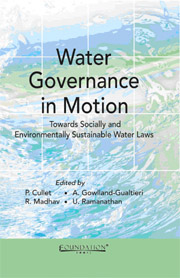Book contents
- Frontmatter
- Contents
- Acknowledgments
- Contributor Biographies
- Introduction
- I Water Law, Policy and Institutional Reforms in India
- II Ongoing Irrigation and Ground Water Reforms in India
- III Perspectives on Privatisation
- 8 Tirupur Water Supply and Sanitation Project: A Revolution in Water Resource Management?
- 9 The World Bank's Influence on Water Privatisation in Argentina: The Experience of the City of Buenos Aires
- 10 The Linkages between Access to Water and Water Scarcity with International Investment Law and The WTO Regime
- 11 More Drops for Hyderabad City, Less Crops for Farmers: Water Institutions and Reallocation in Andhra Pradesh
- IV Environment and Human Rights
- V Comparative Perspectives on Reforms
- Bibliography
11 - More Drops for Hyderabad City, Less Crops for Farmers: Water Institutions and Reallocation in Andhra Pradesh
from III - Perspectives on Privatisation
Published online by Cambridge University Press: 26 October 2011
- Frontmatter
- Contents
- Acknowledgments
- Contributor Biographies
- Introduction
- I Water Law, Policy and Institutional Reforms in India
- II Ongoing Irrigation and Ground Water Reforms in India
- III Perspectives on Privatisation
- 8 Tirupur Water Supply and Sanitation Project: A Revolution in Water Resource Management?
- 9 The World Bank's Influence on Water Privatisation in Argentina: The Experience of the City of Buenos Aires
- 10 The Linkages between Access to Water and Water Scarcity with International Investment Law and The WTO Regime
- 11 More Drops for Hyderabad City, Less Crops for Farmers: Water Institutions and Reallocation in Andhra Pradesh
- IV Environment and Human Rights
- V Comparative Perspectives on Reforms
- Bibliography
Summary
As water is a scarce resource there must be some rule over precedence in its use. Paramount is the right to quench thirst. Even appropriated water is overruled by the necessity to provide water for man and beasts where no other suitable supply is available.
Introduction
Global urban population growth, particularly in developing countries, is happening at an unprecedented rate. The world population rose from 750 million in 1950 to 2.9 billion in 2000, and the number of people living in urban areas has equalled the rural population in 2007, and is on the way to reaching sixty per cent by 2030. The sustainability of such a vibrant growth is contingent upon the availability of sufficient water for covering agricultural, domestic, commercial, industrial, environmental as well as other minor demands. If urban demand for water is growing, the availability of the resource has shrunk over the last decades due to massive diversions for agricultural needs. As hydrologists like to put it, many river basins around the world are reaching the stage of closure, which occurs when all available water in a basin is utilised. Reallocating water then becomes necessary, for instance when a particular user such as a city wants to increase its withdrawals. Under these conditions, water conflicts are likely to develop, and appropriate rules, policies, and organisations responsible for transferring water between users need to be in place.
- Type
- Chapter
- Information
- Water Governance in MotionTowards Socially and Environmentally Sustainable Water Laws, pp. 299 - 330Publisher: Foundation BooksPrint publication year: 2010



